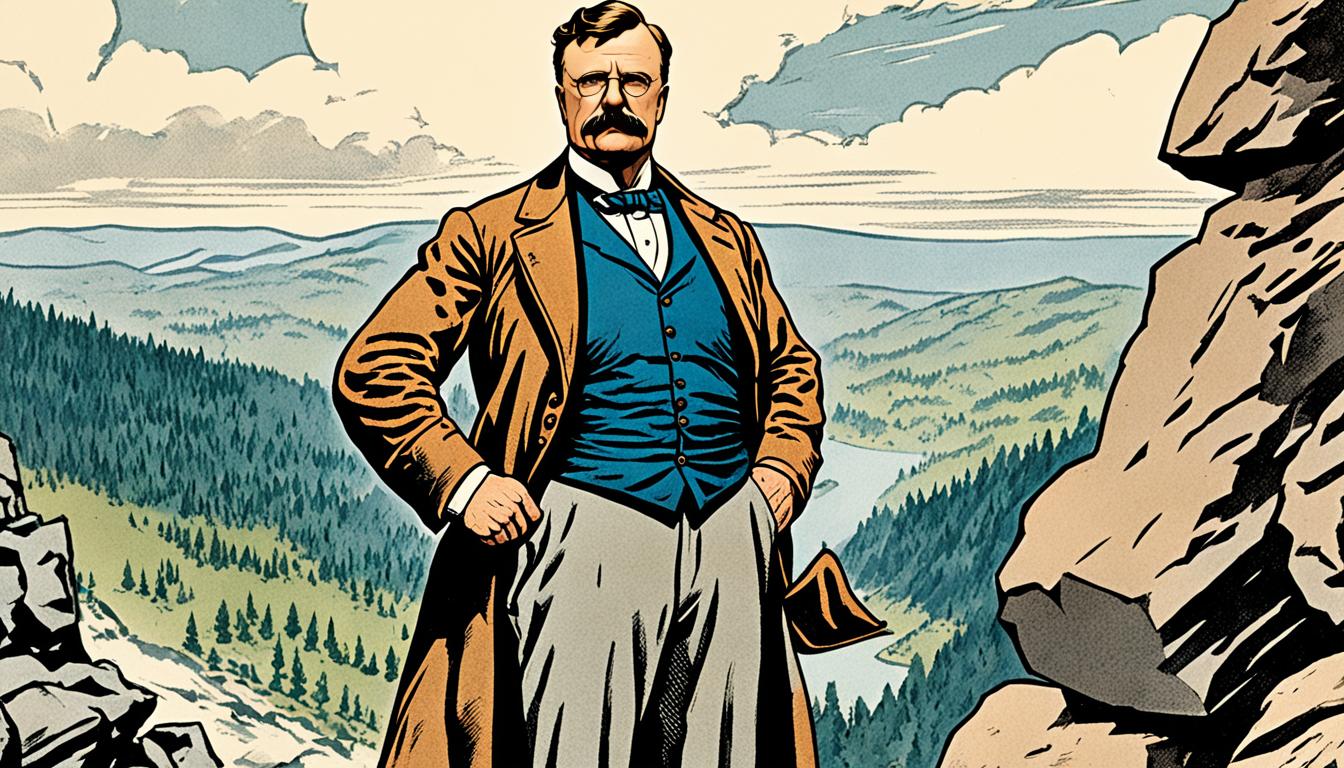In the early 1900s, Theodore Roosevelt reshaped American politics. He was the 26th President, known for vigor and bold leadership. Born in 1858 in New York City to a wealthy family, he overcame health challenges. His drive and passion made him a key figure in American history.
At almost 43, Roosevelt was the youngest President in U.S. history, serving from 1901 to 1909. He pushed for progressive reforms and advocated for strong foreign policy.
Roosevelt’s military bravery shone as a lieutenant colonel in the Rough Riders1. His experiences in the Spanish-American War fueled his advocacy for a robust military. He valued America’s global influence highly.
He committed to preserving the environment and expanding natural resources. Under his watch, nearly 200 million acres were conserved for forests, reserves, and refuges2. Roosevelt’s efforts ensured America’s natural beauty would endure.
Roosevelt’s impact wasn’t just domestic. He earned the Nobel Peace Prize for ending the Russo-Japanese War1. His “big-stick policy” advocated for American strength globally. He was crucial in initiating the Panama Canal2.
Roosevelt’s presidency was a time of progressive change. His ideas inspired later presidents like Franklin Roosevelt and John F. Kennedy3. His visionary leadership still influences American politics today.
Key Takeaways:
- Theodore Roosevelt became the youngest US President at the age of not quite 43 and held office from 1901 to 1909.
- Roosevelt’s progressive reforms and strong foreign policy left a lasting impact on American politics.
- He played a significant role in the Spanish-American War and won the Nobel Peace Prize for his mediation of the Russo-Japanese War.
- Roosevelt’s conservation efforts resulted in the preservation of nearly 200 million acres of land.
- His leadership paved the way for future reforms and influenced subsequent presidents.
Roosevelt’s Progressive Vision
As President, Roosevelt worked to make the United States better. He wanted the government to help solve society’s issues and make sure the economy was fair for everyone. He saw the government as a key player in making sure workers and businesses were treated fairly. This stopped people from being taken advantage of.
Roosevelt fought hard against large companies that had too much power. Through the Sherman Anti-Trust Act, he went after big businesses that unfairly controlled trade4. This showed he was serious about making sure no company had too much control.
He also paid close attention to workers’ rights. In 1902, he helped settle a big strike by coal miners. This move proved he cared about workers’ conditions and their rights5.
Roosevelt didn’t stop there. He also focused on keeping food and medicines safe for everyone. In 1906, he helped pass laws that made sure food and drugs were healthy and safe5. This showed he cared a lot about the health of Americans.
Roosevelt’s Conservation Efforts
Theodore Roosevelt was a president who cared deeply about the environment. He worked hard to protect America’s wilderness and animals. By managing natural resources well, he wanted to save them for those who would come after us.
Roosevelt saved about 230 million acres of land for everyone to enjoy6. He started 150 national forests and 51 places for birds to live safely6. He also made five national parks and 18 important landmarks, like the famous Chalmette Monument6.
Even after he was president, Roosevelt’s ideas helped our parks grow6. He brought in a law in 1906 that let him protect special places as national monuments6. This was a big step in keeping important parts of our history safe for the future.
In 1905, he made the United States Forest Service6. This group took care of 150 million acres of forest. They made sure the forests could be used but also protected. They added 86 million acres that used to belong to native tribes to these forests7.
Roosevelt also worked to protect animals. He set up 51 spaces where birds could thrive6. He made sure every state had a place for animals to be safe. North Dakota has more of these places than any other state6.
Roosevelt’s hard work changed how we think about nature. He showed us how to care for our planet8. Now, we have many parks and forests where we can enjoy nature’s beauty thanks to him8.
Roosevelt’s Conservation Efforts at a Glance
| Accomplishments | Statistical Data |
|---|---|
| Public Land Protection | Approximately 230 million acres of public land protected6 |
| National Forests | 150 national forests established6 |
| Federal Bird Preserves | 51 federal bird preserves established6 |
| National Parks | Five national parks created8 |
| National Monuments | Eighteen national monuments designated6 |
| Antiquities Act | Provided the authority to establish national monuments, including the Chalmette Monument and Grounds6 |
| United States Forest Service | Established in 1905, dedicating 150 million acres of land as national forests6 |
| Federal Bird Reserves | 51 Federal Bird Reserves created6 |
| Wildlife Refuges | Refuge established in every state, with North Dakota having the most refuges6 |
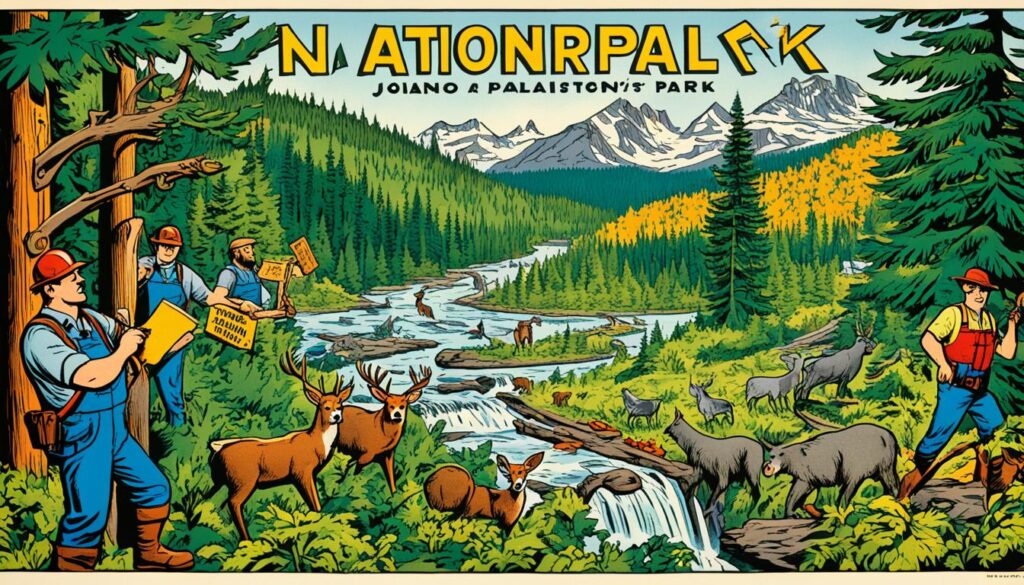
Roosevelt’s Leadership Style
Theodore Roosevelt was known for his ability to connect with people and shape opinions9. His charm and understanding of the media helped him share his ideas widely. He built strong relationships with the public to support his goals.
Roosevelt wanted to lead with unwavering honesty9. He was very aware of himself and smart in making choices9. His confidence inspired others to join him9.
Roosevelt’s strength was his endless energy9. This vitality let him face many challenges head-on. He valued family and always aimed for progress9. His decisions were guided by strong morals9.
He was sometimes reluctant to compromise9. This showed his dedication but also made it hard to find common ground.
Roosevelt’s strong values shaped his leadership. He served his country with dedication, even during hard times9. He fought for what he believed in, despite health issues.
Today, Roosevelt inspires many leaders. His focus on courage, action, and putting the team first are admired10. He was a great reader and learned from history10. Roosevelt knew the importance of talking to opponents and keeping promises10. He always stayed committed to his family10.
| Roosevelt’s Leadership Style | Source |
|---|---|
| Charismatic leader who shaped public opinion and had a strong rapport with the public | Statistical Data 1 |
| Extreme desire to lead, integrity, self-awareness, cognitive ability, and self-confidence | Statistical Data 1 |
| Man of action, grounded in family values, projected visionary leadership style, strong moral and ethical reasoning, and overall courage | Statistical Data 1 |
| Reluctance to compromise during political battles | Statistical Data 1 |
| Call to service and dedication to serving his country despite health challenges | Statistical Data 1 |
| Desire for self-creation, emphasis on courage, preference for action | Statistical Data 2 |
| Leading by example, voracious reader, historical inspiration | Statistical Data 2 |
| Maintaining open communication, keeping commitments, dedication to family | Statistical Data 2 |
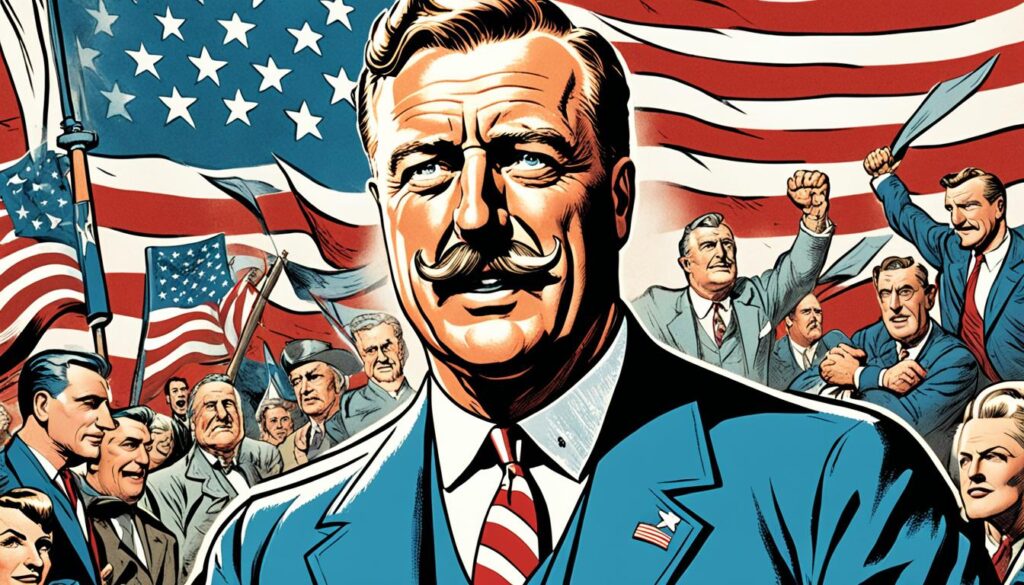
Roosevelt’s Legacy
Theodore Roosevelt changed American politics and society in big ways. His leadership and progressive vision left a lasting mark on the country. Roosevelt’s work still influences the nation today.
Roosevelt was key in pushing forward the progressive movement. He supported laws for welfare, government regulation, and conservation11.He aimed for a fair society and a government that looks out for its people. His efforts laid the foundation for future policies to help citizens and fight inequality.
Roosevelt also changed how America dealt in international matters. He worked on important diplomatic deals like the Panama Canal11.His strong stance on foreign policy made the U.S. a bigger player on the world stage.
Roosevelt’s ideas didn’t end with his presidency. His Progressive Party in 1912 pushed for federal regulations11.This influenced major movements like the New Deal and the Great Society. They all sought social and economic reform, building on Roosevelt’s vision.
His leadership style also made a big difference. Roosevelt used charisma and the media to speak directly to Americans11.This new way meant leaders after him had to be good communicators. It changed presidential politics forever.
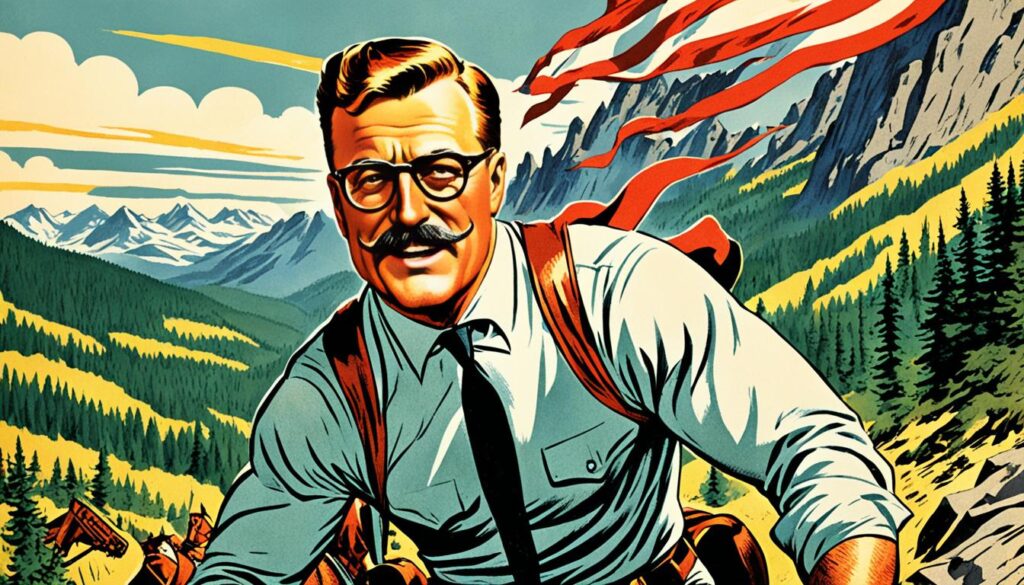
Roosevelt was also a big believer in conservation. He protected 240 million acres for parks and wildlife1213.His work led to the environmental movement. He wanted to make sure nature was there for future people.
Yet, conservation faces problems like lack of diversity in hunting. About 96% of hunters are white men who are older13.For conservation to last, hunting needs more variety. Efforts are underway to make hunting welcoming for everyone. Also, partnerships with communities of color are key to conserving nature for everybody.
Roosevelt’s legacy is all about progress, reform, and keeping nature safe. He inspires leaders to aim for a better and greener America for everyone.
Roosevelt’s Later Years
After leaving the presidency in 1909, Roosevelt went on a 10-month hunting safari in Africa14. He loved adventures. Even after he was no longer president, Roosevelt stayed involved in politics. He helped shape American history. In 1912, he ran for president again with the Progressive Party14. Though he didn’t win, he got 88 electoral votes14.
Roosevelt cared deeply about nature even after his presidency. He worked hard to save natural places. He supported laws to protect nature and start national parks14.
Beyond nature, Roosevelt influenced important future movements. He overcame challenges, like recovering from a gunshot while campaigning14. His resilience showed how determined he was.
Roosevelt faced tough times too. His sons were hurt in war, and his youngest son, Quentin, died in World War I14. Roosevelt died in 1919, shortly after turning 6014.
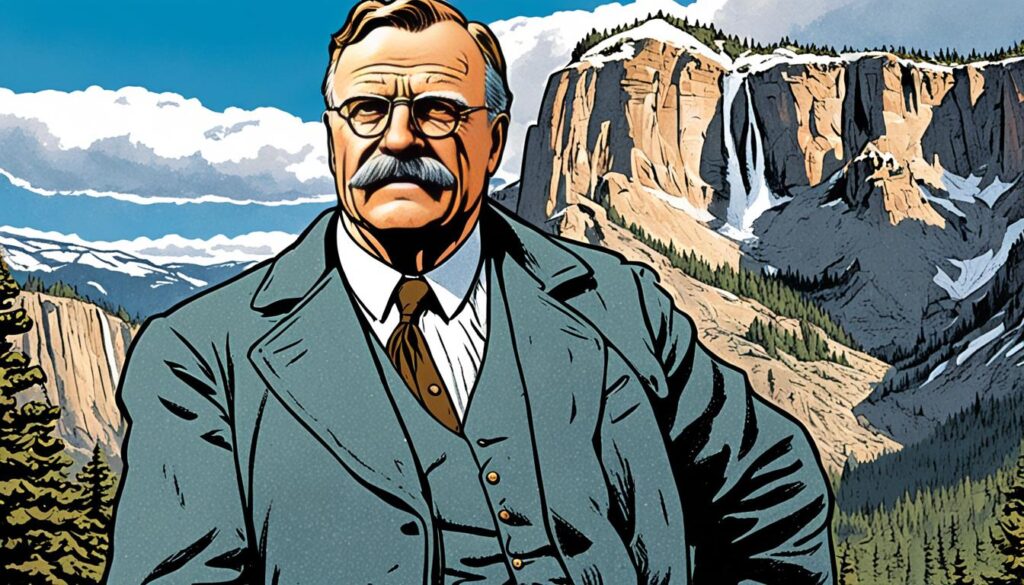
Roosevelt’s final years show his dedication to making the world better. He worked for progress, nature, and the people. His work still touches our lives today. Roosevelt’s story encourages us to keep aiming for positive changes.
Conclusion
Theodore Roosevelt was a president who changed America. He was in office from 1901 to 190915. He made the president’s role stronger and won his elections big time15. Roosevelt loved nature. He protected almost 200 million acres for parks and wildlife15. He also helped build the Panama Canal15.
Roosevelt did great things even after being president. He saved birds at Pelican Island and started the Bureau of Forestry16. He protected places like the Grand Canyon and Muir Woods16. His adventure to the Amazon showed his love for exploring and nature16.
Roosevelt’s ideas and actions still affect us today. He believed in using government to help people and society15. His sons served in World War I, showing the values he taught15. Even though he died in 191916, his spirit influences America still.
Roosevelt is remembered as one of the most active American presidents17. His forward-looking ideas, efforts to save nature, and strong leadership have left a lasting impact. We still honor him today.

